Gideon Jeph Wabvuta, Performing Artist
Tafadzwa Bob Mutumbi
Performing Artist
Tafadzwa Bob, called Tafbob by friends, was born in 1988 in Marondera, but grew up in Chitungwiza, a highly populated town (once called a Dormitory Town before Zimbabwe’s independence in 1980). Chitungwiza is about 15 miles south of Harare, the capital).
Tafbob’s mom raised his three brothers and him in a normal and happy family life. He is the only one in his family working in the arts, though he is quick to say that all the members of his family are good singers and play instruments. He says he is musically challenged but has an ear for recognizing good music and composing songs. He just can’t sing or play music. When it comes to the dramatic arts, he excels. He is an accomplished actor, playwright, and director. In 2015, Tafbob won the Walter Muparutsa Fellowship to attend a Master’s of Fine Arts program at the Dell’Arte International School of Physical Theatre in Northern California.
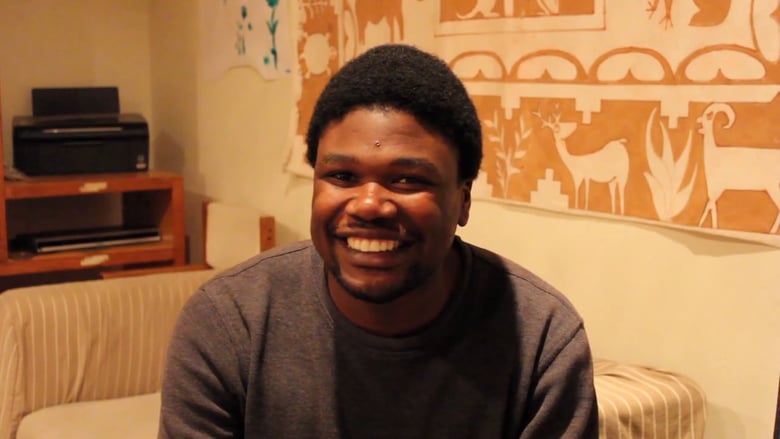
Tafbob says that when people outside Zimbabwe think of his country, they immediately say, “Ah Zimbabwe . . . Robert Mugabe.” But Tafbob wants people to know that Zimbabwe is so much more than Mugabe. He wants to use his storytelling in theatre to tell people, those in Zimbabwe and outsiders, about the richness of their culture and customs. And he wants them to understand why they feel so much fear—from generations of abuse, first by the colonists and then by the dictatorship that followed the country’s independence from the colonists. Zimbabweans need to face the decades of fear and abuse in order to heal.
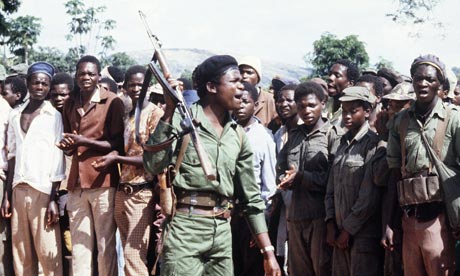
Robert Mugabe must be difficult for Zimbabweans to reconcile. Decades ago, when Mugabe was a young rebel, he was a revered man. As a young man he, along with several others, led rebellions against the colonial rule, which resulted in him being tortured and imprisoned for nine years. After his release from prison, he was a leader in his country’s fight for independence from Ian Smith’s white-ruled state of Rhodesia. He has led Zimbabwe since its independence in 1980. And his reign of terror grew along with his power. As the leader of the Zimbabwe African National Union-Patriotic Front (ZANU-PF) political party and president of Zimbabwe since 1987, he is responsible for creating an authoritarian rule and leveling so many atrocities against his people. From 1983 to 1987, he led a genocide that resulted in the murder of 20,000 Ndebele civilians. He encouraged groups of people to trespass and terrorize white land-owners, resulting in them fleeing their farms and Zimbabwe altogether. This led to the commercial farming industry collapse. In 2005, he ordered the demolition of homes in cities and towns across the country in what he called “Operation Murambatsvina—clean up trash“, which left millions homeless. Mugabe’s dictatorship is the cause of Zimbabwe’s food shortages, runaway inflation, and economic collapse.
Mugabe’s power weakened after a disputed 2008 reelection. After the election violence erupted around the country, led by ZANU-PF members and the security forces led by the dreaded CIO (central intelligence organization). Opposing forces pressured Mugabe into forming an inclusive government, sharing power with the opposition party called the Movement for Democratic Change (MDC) in 2009. He also agreed to work with the Constitution Select Committee (COPAC) to write Zimbabwe’s new constitution. While he used intimidation and violence to obstruct COPAC’s efforts, the constitution was drafted.
On May 22, 2013, President Mugabe signed COPAC’s constitution in Harare, Zimbabwe’s capital. Zimbabwean’s exercised their democratic freedom, limiting their president’s power.
For now, Mugabe remains the head of Zimbabwe and without a known successor. It is difficult to know what lies ahead for the country. People are still afraid to speak the truth to power. They are conditioned to self-censor their feelings and thoughts.
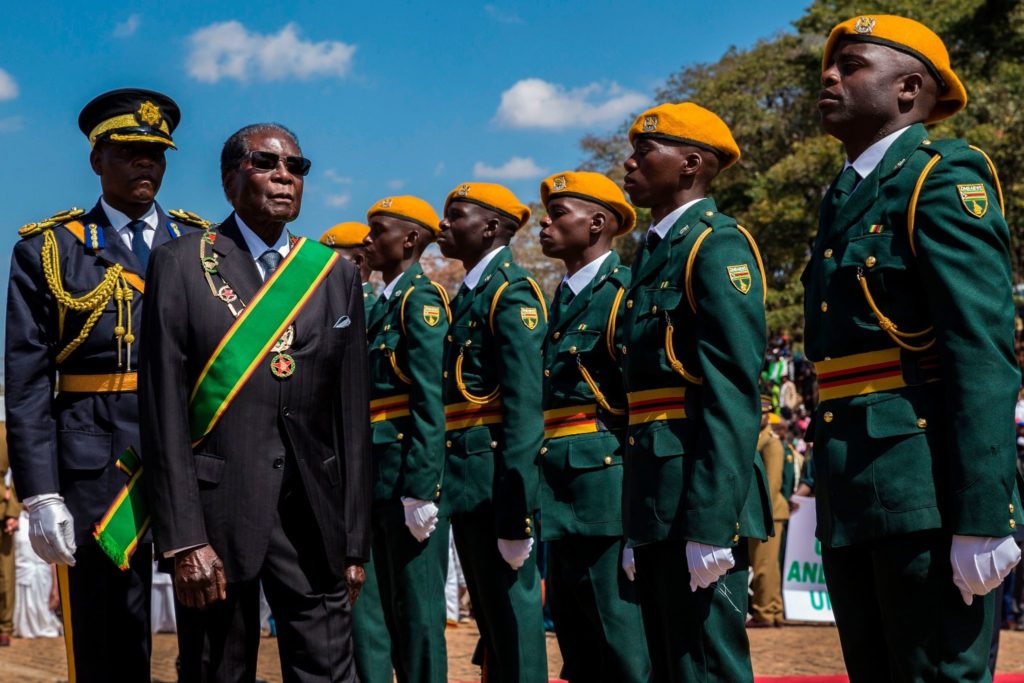
Afterword: A year after interviewing Tafbob and writing this story, the New York Times reported that the Zimbabwe military arrested and stripped President Robert Mugabe of his authority in a successful coup led by Emmerson Mnangagwa. Mugabe was given a deadline of noon on Monday, November 20, 2017 to resign or face impeachment by the Parliament. The deadline passed without a public statement from Mugabe. Meanwhile, the Lacoste faction of the ZANU-PF party removed Mugabe as their leader, naming Mnangagwa, nicknamed the Crocodile, as its new leader. On November 21, 2017, the New York Times announced, “that Robert Mugabe resigne[d] as Zimbabwe’s President, ending 37-year rule”. Emmerson Mnangagwa was sworn in as the new president of Zimbabwe on November 24, 2017. “Mnangagwa vowed to reimburse farmers whose land was seized under Mugabe, but said the seizures cannot be reversed.” The country will hold democratic elections for president in 2018. A new era for Zimbabwe.
******
Growing up and living in Zimbabwe under the authoritarian rule of Mugabe has affected Tafbob in regards to self-censorship. People need to be careful about what they say, the way you say it, and to whom they say it. As a playwright and actor, this self-censorship affects the work Tafbob creates. He is uncertain about the response by those who experience his art—will people accept what he is saying or will they misunderstand or twist his message? Or will his performance result in him being arrested? These concerns cause Tafbob and other artists to naturally feel fear and stifle their artistic voices.
In the beginning of Tafbob’s career as a performing artist, he remembers feeling like he was in a self-imposed cocoon. He avoided talking and expressing himself in his performance work about real issues of oppression, things that were affecting him in his life, his dreams, and his aspirations. But as time went on, he could not hold back from facing the issues and he was no longer willing to hold back. “Enough is enough,” he said, “I graduated to becoming a comrade.” He is no longer afraid to express himself and face the consequences of speaking the truth. He said, “I’m ready to die, as long as I die for something that I believe in…and as Steve Biko said, ‘It is better to die for an idea that will live than to live for an idea that will die.’” It is important to Tafbob that his grandchildren know that he died because he stood up for himself. He cannot let other human beings mistreat him. He explained, “Yes, they have power—they use the military to hold down the masses and they can arrest me to suppress my freedom of expression. But if I keep quiet, I’m as good as dead anyway.” Now Tafbob is standing up for himself and others through his performance art.
Tafbob plans to go back to Zimbabwe after he completes his graduate work in the United States. He wants to use his art to help his people—and his country—heal. When he returns to Zimbabwe he wants to build an art school or institute to encourage others to stand up to their fear through performance. When he is home he will create marginalized Zimbabwean narratives. He wants to shine the light on the real people in his country and how they are being affected by and surviving the situation in the country under Mugabe’s power. For Tafbob, these people are the real heroes. It is not just the leaders of the political opposition and civil societies who are fighting against the system, it is also the women who are surviving rape and the men who are surviving the political and economic violence that has taken place over the last 100 years. In telling their stories, he celebrates their survival.
Tafbob understands the risks of returning home and is sensitive to the abuses that have traumatized his country for generations. He does not lose sight of how other artists who have risked expressing themselves have experienced terrible consequences. Artists rebelling against Mugabe’s government sang to the masses in the 1990s. Many have been blacklisted and banned from public performance. One such musician is Thomas Tafirenyika Mapfumo who was intimidated and blacklisted, deciding to flee his country and exile in the United States. Another musician is Leonard Zhakata who, despite torture and imprisonment, continues to live in Zimbabwe. In the last few years, the theatre artist Silvanos Mudzvova was arrested, abducted, beaten, tortured, and made to perform the his play 24 times in a day in front of policemen whilst in police custody. This brutality was in reaction to his two-men play called “Final Push” with Antony Tongani. After staging outside parliament a one-man play called “Missing Diamonds—I Need My Share”, a story about state corruption and the issues of diamond mining, he was detained by the authorities. He now performs “hit and run” shows in public places to avoid arrest.
Music in Zimbabwe is not only performed in efforts of resistance to the oppressive Mugabe government. Music is also used by they government for propoganda. Between 2002 and 2003, the government funded musicians to write and sing jingles that aired every 30 minutes on the radio. The jingles served to remind people of how good Mugabe is for the people. One of those jingle musicians is Tombaoga. Mugabe also used the Mbare Chimurega choir in late 2010 to promote and glorify his government in preparation for the elections and again in 2011, despite the agreement for an inclusive government with the MDC party. Since 2015, the choir’s popularity has declined.
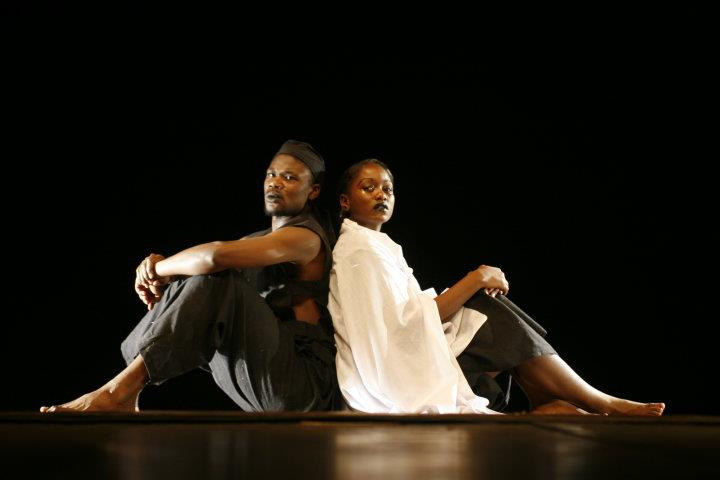
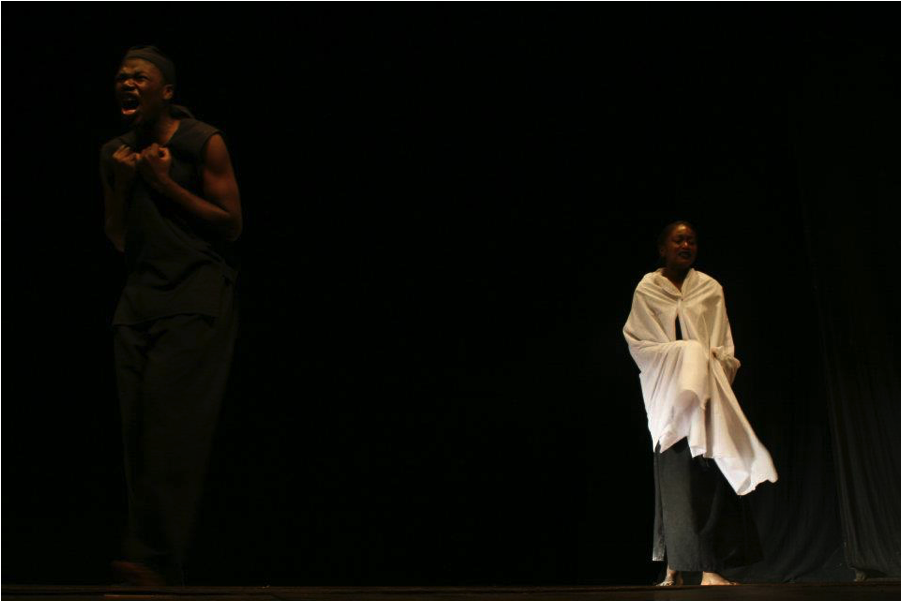
Before Tafbob came to the United States for graduate school, he was working in various modes in theatre back in Zimbabwe. He was writing, acting, and directing where he performed in shows written by others and received scripts in which he would direct the play. Sometimes Tafbob worked in devised productions with an ensemble group such as “The Gospel of Othello” (above), produced by The Hothuas in 2011. Working with The Hothaus sparked his desire to pursue more work in ensemble theatre.
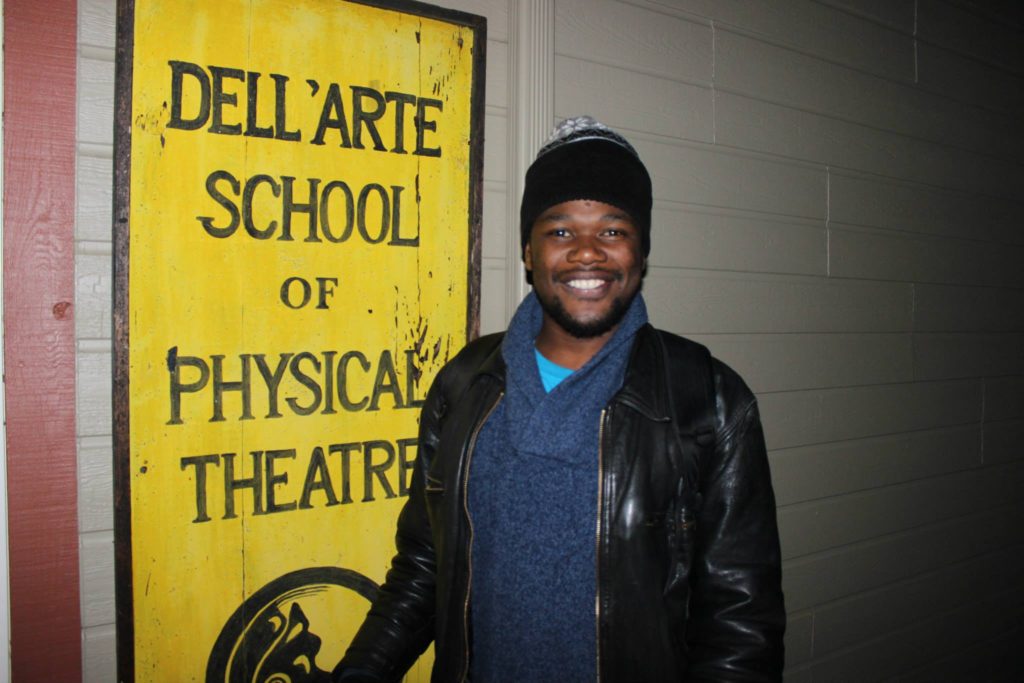
Over the past three years while working on his MFA at Dell’Arte International School of Physical Theatre, Tafbob is honing his craft. Dell’Arte’s program promotes ensemble theatre and trains the performers as actor-creators, meaning that instead of relying on a director, the performers devise and create on their own and they work together to create a story and production. Tafbob will bring this approach back to his country and use various this and other modes of theatre for his storytelling.
Tafbob believes that art and music have a huge impact of human beings. He references an idea that the power of music is that it speaks the language of the heart, the soul, and the mind. He explains that music affects language and how we communicate with others and how we see ourselves. During efforts of the liberation during colonial rule, he said that the rebel forces relied on music choirs to go to the masses to talk about the issues of freedom and need for revolution. It wasn’t enough to hold rallies to engage the people, to motivate them, and to pass on to them the message of the revolution.
Currently, Tafbob is working on a theatrical story that looks at healing racial and political trauma. It is a big issue that is affecting Zimbabwe right now—the accumulation of trauma—some of which is inter-generational trauma—over the last 120 years. Zimbabwe never provided a system to heal the traumas, whether it be from surviving violence, genocide, or the economic downturn that ruined people’s lives. Emotional scars of great grandparents, grandparents, and parents are passed down to their offspring. The cycle of fear and self-censorship continues until the healing of the scars is complete. Tafbob believes that one of the reasons Mugabe is so cruel is that he continues to talk about the traumatic experiences he endured when he was tortured and imprisoned when he was fighting for the country. Mugabe blames his trauma on the white colonial masters. In doing so, he reinforces the pain and passes it down to the people. This cycle is typical of one who has been abused then becomes the abuser. Tafbob is not only looking at his country in need of healing. He is looking at other countries, like the United States where Native American and African Americans have endured and carried the pain of trauma for generations and pass the pain on to future generations. He wants all human beings to heal and he wants to be one of the artistic healers.
